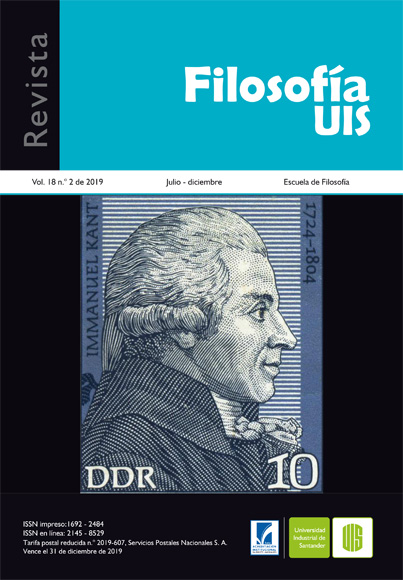On the Right to Resistance in Kant
Published 2019-05-13
Keywords
- Resistance,
- State,
- Society,
- Justice,
- Political philosophy
- Kant ...More
How to Cite
Copyright (c) 2019 Revista Filosofía UIS

This work is licensed under a Creative Commons Attribution 4.0 International License.
Abstract
The writings in which Kant talks about the possibility of exercising a right of resistance, it is remarkable his firm disagreement to the same one, when qualifying the action of resistance as totally inadmissible and is therefore considered the worst of the crimes; this position leads him to conserve the preponderance of the present order of the State. However, it is easy to assume that resistance, together with the implications and resources it deems necessary, would be considered the logical response to the injustices for those who have been adjudicated within the tradition of freedom thinkers. In this paper we will focus on the German philosopher, developing a description of his arguments against his aforementioned position, and the contradictions that have been presented in his thematic axes of the political sphere.
Downloads
References
Barrientos, M. E. L. (2001). Los escritos políticos de Immanuel Kant. Realidad: Revista de Ciencias Sociales y Humanidades, (84), 847-874.
Bau, C. S. O. (2004). Kant: lecturas para el estudio de la desobediencia civil. Daimon Revista Internacional de Filosofía, (33), 187-194.
Beade, I. (2007). Liberalismo y republicanismo en la concepción kantiana de “ciudadanía”. Reflexión Política, 9(17), 58-74.
Beade, I. (2009). Consideraciones acerca de la concepción kantiana de la libertad en sentido político. Revista de filosofía, 65, 25-41.
Bilbeny, N. (1989). Kant y la Revolución Francesa: refutación del derecho de resistencia civil. Anuario de filosofía del derecho, (6), 23-32.
Ceballos, R. (2015). El derecho de resistencia en Kant. Discusiones Filosóficas, 16(27), 105-125, doi: 10.17151/difil.2015.16.27.7.
Flores Vega, M. y Espejel Mena, J. (2008). Corrupción y transparencia: una aproximación desde la filosofía política de Immanuel Kant. Espacios Públicos, 11(21), 44-63.
Kant, I. (1986). Teoría y Práctica. En torno al tópico: “Tal vez esto sea correcto en teoría, pero no sirve para la práctica”. Madrid: Tecnos.
Kant, I. (1993). La Metafísica de las Costumbres. Barcelona: Altaya.
Kant, I. (2003a). ¿Qué es ilustración? Y otros escritos de ética, política y filosofía de la historia. Madrid: Alianza Editorial.
Kant, I. (2003b). El conflicto de las facultades. Madrid: Alianza Editorial.
Kant, I. (2005). Crítica de la Razón Práctica. Ciudad de México: Fondo de Cultura Económica.
Kant, I. (2012). Sobre la Paz Perpetua. Madrid: Alianza Editorial.
Korsgaard, C. (1996). Tomar la ley en nuestras propias manos: Kant sobre el derecho a la revolución. En D. M. Granja y T. Santiago (eds.), La paz y el ideal cosmopolita de la ilustración. Madrid: Tecnos.
Mirete Navarro, J. (1986). Kant y T. Hobbes: pacto social y posibilidad de resistencia al poder político. Anales de Derecho, 9, 133-142. Recuperado de http://revistas.um.es/analesderecho/article/view/82721.
Onfray, M. (2011). Política del rebelde. Tratado de resistencia e insumisión. Barcelona: Anagrama.

